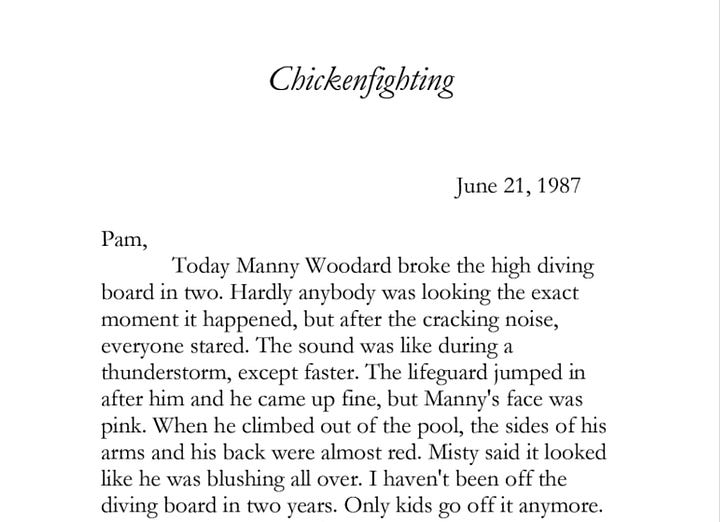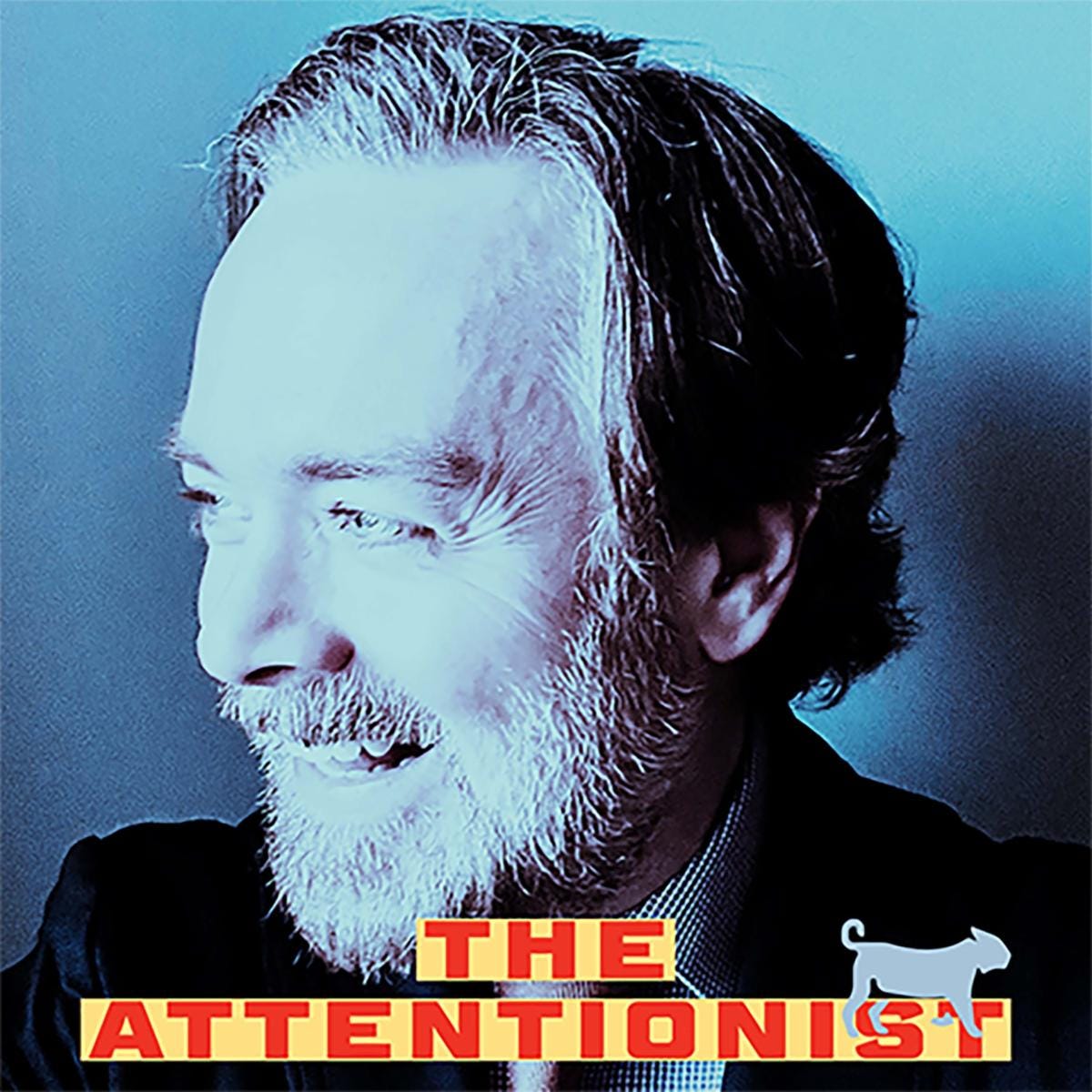Saturday/Sunday/Monday greetings (covering my bases here)! ☀️
A few quick notes before today’s post:
-
’s The Practicing Writer 2.0’s September list of submission opportunities—no fees—dropped yesterday—you can access it here.- Two Instagram posts that made me laugh a lot this week:


- From the August 27 entry of the Zen page-a-day calendar: “There is something wonderfully bold and liberating about saying Yes to our entire imperfect and messy life.” - Tara Brach
- And, “Enjoy yourself. It’s later than you think.” - Socrates
- At the bottom of today’s post, you’ll find information about a new book by Psychology Today contributor and prose writer Meredith Gordon, LCSW, Stop Enabling. Start Living. Help for Parents of Highly Dependent Adult Children. (Congrats, Meredith!)
- Beginning Wednesday, September 25 (6-8:30 PM PT), I'll be teaching a 10-week short story workshop on Zoom, "Four Beginnings, One Ending," for Stanford University Continuing Studies. Registration details here. Still a few spaces available.
—
Way back when Barack Obama was in his first term, I met writer and musician Geoff Little (and now a Substacker at
). He’d recently published a story collection, Summers, and when he visited Chicago in the fall of 2009, we met at Kopi Café on Clark Street. (Just up the block from the great indie bookstore Women & Children First). Geoff was shy and polite and he had a lot of curls that I admired/envied (in silence, until now!)—he has since traded in his curls for a professional, get-’er-done look.I can’t remember much of what we discussed, but I think I probably shared this advice about writing: a) it’s hard, and b) it doesn’t really get any easier, but with steady practice, it will become a habit and a solace.
Below is the first of a two-part interview here (second part to follow later this year).
‘Trajectory’ sounds large, willful, intense, like a hurricane path…The truth is more like a tangled white earphones cable…
Christine/Bookish: We met in 2009, right around the time your debut story collection, Summers, was published. When did you begin writing fiction?
Geoff Little: I love that we met years ago and have kept in touch. And it is so nice to be welcomed into your Substack community. (I’ve been a Bookish subscriber of yours for a while—and WUTT—for a few minutes I’m on your side of the screen!?!)
I had an overactive imagination as a child. I mean, most children do. Make-believe has always made a lot of sense to me. But regarding writing, I had a “big break” at age seven, in second grade (this was about 1983). A teacher realized she had…a bit of a nut on her hands (my description), me.

One grammar assignment, in particular, was supposed to be “write about a vacation,” which should have been pedestrian enough, but I wrote about a “family” of blue herons who traveled to the Grand Canyon from Virginia Beach, Virginia (my hometown), including a plot twist: they skinned their knees amongst the rocky landscape’s crags and gorges. It was so unusual that the teacher from this small, religious school contacted my mother, both out of concern and, I think, a kind of respect (or at least that’s what I have told myself).
In more recent years, I have asked my mother if this story sounded true. Further, did she even possibly have that composition notebook from this time (the kind with black and white squiggles in a cardboard wrap-around cover)? She said yes, the story did happen and that the book is stowed somewhere in boxes in a barn building on the family property. She said she’d get it for me.
Despite many holidays and special occasions since, I’ve not again heard mention of the second grade “collection” from my mother. Maybe one day I will see it again. The older I get, I sense that with much of life and our memories, rather than what actually happened or what may have actually been transcribed, it’s the stories and feelings around those stories that most ring true.


CS: What was the trajectory from writing short stories to creating the brief, wild, immersive audio stories that you’ve written and produced for The Attentionist since your debut story, “Contortionist,” was published in September 2021?
GL: Oh nice. Trajectory sounds large, willful, intense, like a hurricane path. I love thinking this is a description of anything in my life. The truth is more like a tangled white earphones cable, but here we go: Deep in the odd shelter-in-place COVID times of 2020 and 2021, in all of the alone-of-it, a thought came bubbling up regularly, Who is doing experimental, short fiction as a podcast?
It was easy to find varieties of great stuff online, including long form fiction across installments from podcasters. But I could never quite find the essence of what I was personally looking for. Story narration was a big part of what seemed present everywhere in podcast-land. However, I was interested in heightened characterization and dialogue. I wanted a blunt immersion for the listener right into a story and scene. So, in fits and starts, a feeling that something “should exist” got the best of me. Such inertia led to the first story, “Contortionist.”
Podcasting often feels like releasing raindrops into the ocean.
Another dynamic—I’d had my own personal podcast already, also called The Attentionist, since 2015. In this original iteration of the show, I’d completed live interviews with guests – including my yoga instructor, an 8th grade teacher, freshman-year college buddies, a friend who’d suffered vision loss, a pagan spiritualist—I was open. It wasn’t just interviews. There was also audio of me interacting with strangers/audiences, and then occasional monologues where I’d wax eloquently...this was from 2015 to 2021. I had about 80 episodes.
Further, on that original Attentionist podcast, using the curious (inscrutable?) podcast statistics at the hosting website, I’d apparently had several hundred unique listeners worldwide since my start, and an average of like, 25-50 listens per episode.
I’m not sure the statistics were accurate; podcasting often feels like releasing raindrops into the ocean. I could not get folks to react with me online via my website or email, despite asking for such things. I had very few social media responses via Facebook and X (formerly Twitter). Consultant-types told this was somewhat normal. But it had the effect on me was, why keep going with this?
[By the way, the podcast title, The Attentionist, I know sounds like, “Oh, Geoff is the Attentionist, what a dude…” – but the truth is this: it is the beloved listener who is actually the (ahem) gracious giver of attention to me/the show and thus, THEY are the Attentionist.]
Anyway, as I noted earlier, by late summer 2021, I put that single episode of my own audio fiction out, the Contortionist story and I did get feedback. Mainly, some version of, “Well, this is pleasantly weird.” Others asked of the story, “How is that possible?” My wife, forever loving with me but fiercely honest, attempted to draw a picture of the couple in the story during their strange hike.
Tara is a businesswoman and develops app technology for the health care industry. It agitated her that she could not illustrate the couple’s actions, and asked me to explain what was going on. I said a version of, I can’t. In response, she playfully re-sent the audio file through social media to friends, galvanizing support for “This story isn’t even possible, is it?”
So, with modest confidence, I went on to create thirteen more “brief, wild, immersive fictions.” My default genre is usually humor. As a writer, it makes me feel comfortable and the right kind of performative. However, I’ve veered into more serious territory. In Voice Memo from Darién Gap, a young soldier records a long message to his girlfriend on his cell phone in an unsafe, even harrowing, Panamanian jungle. (It’s based on a real, current, frightening migration crisis, much worth reading about.)
CS: You’ve recently started a Substack,
. Tell us a little about what you’re doing in your newsletter.GL: Substack has been great! I so appreciate how there are actually limitations as to how frilly the posts are or can be—that appears to be a theme of the platform. There seem to be guardrails from seeing or adding too many extras. Text is the objective!
I have ten posts and counting at the moment (more to come). Read them here!
I post on Thursdays each week. My goal is talk about my life and my creative process generally, especially as it relates to the audio stories I have made. My main posts are free, with the hope of gaining support through paid subscribers. Paid subscribers will also have access to a variety of additional content! I’m still building things out and enjoying the creative process of it.
—
New book news:
A former writing student of mine and fellow southern California resident, Meredith Gordon, LCSW, has a new ebook available, Stop Enabling. Start Living. Help for Parents of Highly Dependent Adult Children.
As described by Meredith: Grounded in my clinical work with families, this short, powerful read grew out of a viral post I wrote for Psychology Today, and speaks to parents struggling with their adult child’s failure to launch.
Stop Enabling. Start Living. is not about tough love or cutting ties, nor is it about fault-finding or placing blame. Instead, it's a concise blueprint for parents to help better navigate their relationship immediately, in healthier ways for everyone, particularly themselves.
Available wherever you buy ebooks. Also, look for my Surviving Narcissism ebooks which, to date, have sold over 25,000 copies and remain widely recommended by therapists and attorneys alike (published under Meredith Resnick).





This: The truth is more like a tangled white earphones cable.
Nice interview! Looking forward to diving into his substack